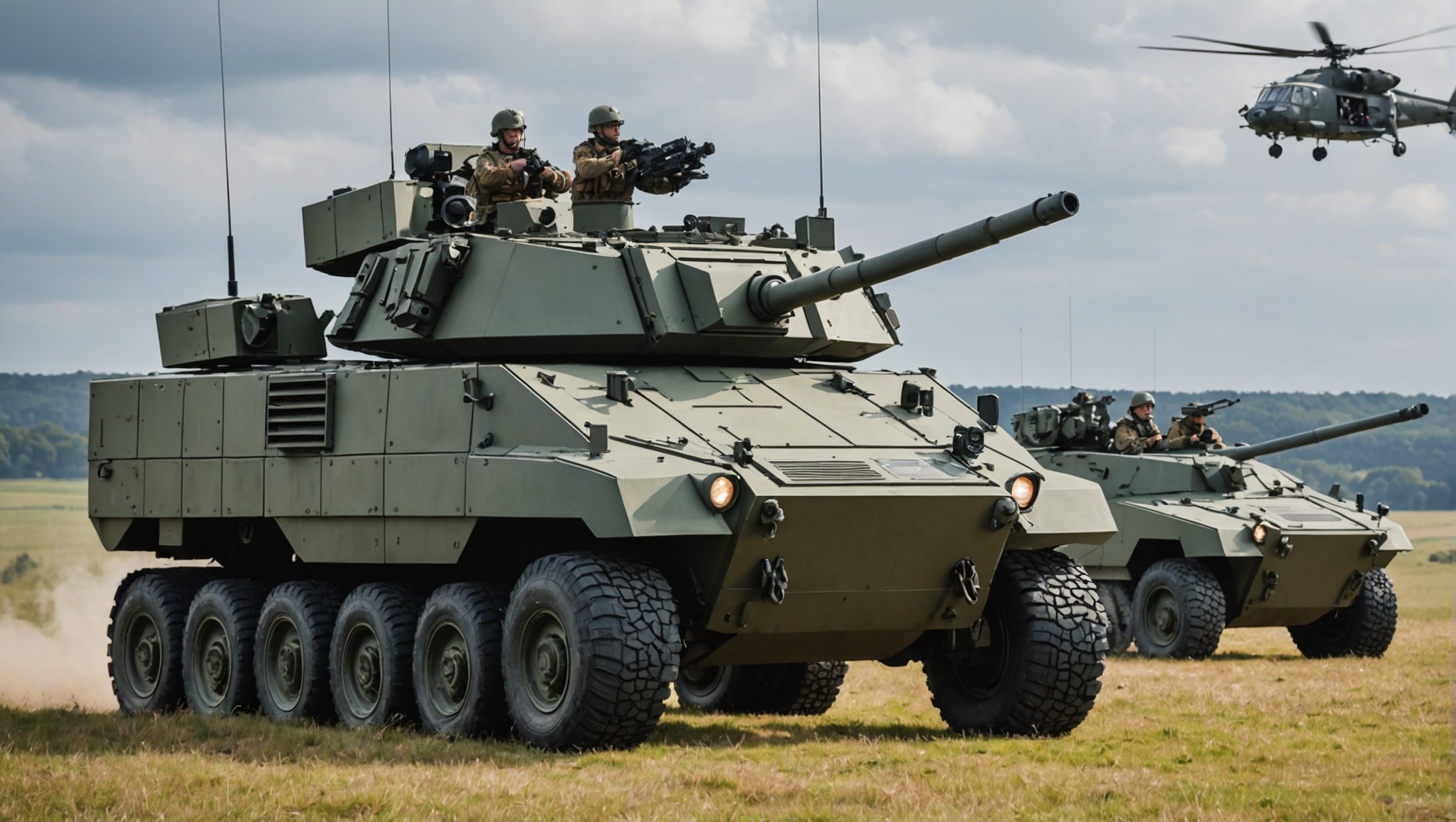The integration of artificial intelligence in military defence systems has been a topic of considerable interest and debate, particularly in the context of UK military operations. The evolution of technology has brought about significant potential for autonomous systems and autonomous weapons, thereby enhancing the defence capabilities of the armed forces. However, the process of incorporating AI-enabled systems into the UK military infrastructure is fraught with challenges. This article delves into these complexities, examining the various aspects that affect this integration and what it means for the future of defence.
The Role of AI in Modern Military Defence Systems
Artificial intelligence, or AI, has the potential to revolutionise military defence systems by providing enhanced decision-making capabilities, increasing efficiency, and offering new strategic advantages. The ambition is to develop systems that can operate at machine speed, conduct rapid data analysis, and execute complex military operations with minimal human intervention. Leveraging machine learning and data science, AI can help in processing vast amounts of data collected from various sensors and intelligence sources to offer actionable insights in real-time.
Topic to read : What Are the Legal Implications of AI-Generated Content in the UK?
One of the most significant advantages of integrating AI into military systems is its ability to improve autonomous weapons platforms. These systems can make decisions based on pre-set criteria, allowing for quicker responses during critical situations. Furthermore, AI can enhance cyber security by identifying and mitigating cyber attacks more effectively than traditional methods.
However, the development and deployment of AI in military contexts are not without hurdles. The ethical implications, legal standards, and the potential for misuse require careful consideration and robust defence security measures. Furthermore, the technological infrastructure needed to support such advancements must be reliable and resilient against both physical and cyber threats.
Topic to read : What Are the Key Trends in AI-Driven Market Analysis for UK Startups?
Ethical and Legal Challenges
The integration of AI into military defence systems brings forth a myriad of ethical and legal challenges that cannot be overlooked. These complexities arise from the potential for AI to make autonomous decisions, which could have life-or-death consequences. The primary ethical concern revolves around the notion of human-machine interaction, especially in the context of autonomous weapons.
One critical question is whether it is morally acceptable to allow machines to make decisions regarding the use of lethal force. The defence centre and various international bodies are grappling with this dilemma, seeking to establish guidelines and frameworks that can govern the use of AI in warfare. The potential for state actors to misuse AI for unethical purposes, including cyber attacks and manipulative propaganda, further complicates the scenario.
Legal challenges are equally daunting. Current international laws, such as the Geneva Conventions, were not designed with AI in mind. As such, there is a pressing need for new regulations that address the unique characteristics of AI-enabled systems. These regulations must balance the need for national security with the ethical obligation to preserve human rights. The centre daic (Defence Artificial Intelligence Centre) is likely to play a crucial role in shaping these new standards.
Moreover, there is also the issue of accountability. In the event of an autonomous system causing unintended harm, determining who is responsible can be complicated. Is it the software developer, the military commander, or the machine itself? These questions are not easily answered and require a multi-faceted approach involving ethicists, legal experts, and military professionals.
Technological and Infrastructure Challenges
Incorporating AI into military defence systems demands significant advancements in science technology and infrastructure. The development of robust AI technologies requires not only substantial financial investments but also expertise in various fields, including data science, machine learning, and cyber security. This presents a formidable challenge for the UK military, which must ensure that it has access to the necessary resources and skills.
One of the primary technological challenges is ensuring the reliability and accuracy of AI systems. In military operations, even a minor error can have catastrophic consequences. Therefore, extensive testing and validation are required to ensure that AI systems can perform reliably under various conditions. This includes command control systems that can process vast amounts of data in real-time and provide accurate and actionable insights.
Furthermore, the infrastructure needed to support AI integration is highly complex. This includes not only the physical hardware, such as data centres and communication networks, but also the software and algorithms that power AI systems. Ensuring the security of this infrastructure is paramount, as it is a prime target for cyber attacks. The defence security framework must be robust enough to protect against both external threats and internal vulnerabilities.
Another significant challenge is the integration of AI with existing military systems. This requires seamless interoperability, which can be difficult to achieve given the diverse range of technologies and platforms currently in use. Ensuring that AI systems can communicate effectively with other military systems is crucial for their successful deployment.
Human and Organizational Challenges
The integration of AI in military defence systems also presents significant human and organizational challenges. At the core of this issue is the relationship between humans and machines. Command control and decision-making processes will need to be adapted to incorporate AI, which may require a shift in traditional military hierarchies and roles.
One of the primary human challenges is the need for appropriate training and education. Military personnel must be trained not only to use AI systems but also to understand their limitations and potential vulnerabilities. This requires a significant investment in education and training programs, as well as a cultural shift within the military to embrace new technologies.
Moreover, there is the challenge of trust. For AI systems to be effective, military personnel must trust that these systems will perform reliably and ethically. Building this trust requires transparency in how AI systems are developed and deployed, as well as clear communication about their capabilities and limitations.
Organizational challenges are also significant. The integration of AI requires changes in military structures and processes, which can be difficult to implement. This includes the need for new roles and responsibilities, as well as changes in how decisions are made and executed. Ensuring that these changes are implemented effectively requires strong leadership and a clear vision for the future of the military.
Strategic and Geopolitical Challenges
The integration of AI in military defence systems also presents strategic and geopolitical challenges. As AI technologies continue to evolve, they are likely to play an increasingly important role in shaping global power dynamics. This presents both opportunities and risks for the UK military.
One of the primary strategic challenges is the need to stay ahead of potential adversaries. The development and deployment of AI technologies require significant investments in research and development, as well as collaboration with international partners. The UK military must ensure that it has access to the latest AI technologies and that it can deploy these technologies effectively in a range of scenarios.
Geopolitical challenges are also significant. The use of AI in military operations raises important questions about arms control and international security. The UK military must navigate these challenges carefully, working with international partners to establish norms and standards for the use of AI in warfare.
Moreover, there is the challenge of ensuring that AI technologies are used ethically and responsibly. This requires strong leadership and a clear commitment to upholding international laws and standards. The UK military must work closely with international partners to ensure that AI technologies are used in a way that promotes peace and security, rather than escalating conflicts.
Integrating AI into UK military defence systems presents a range of challenges, from ethical and legal considerations to technological, human, and strategic issues. While the potential benefits of AI are enormous, the path to successful integration is fraught with complexities that require careful and thoughtful navigation.
By addressing these challenges head-on, investing in research and development, and fostering international collaboration, the UK military can harness the power of AI to enhance its defence capabilities. Ultimately, the successful integration of AI will depend on a balanced approach that considers both the opportunities and the risks, ensuring that AI technologies are used in a way that is ethical, effective, and aligned with the broader goals of national and international security.











